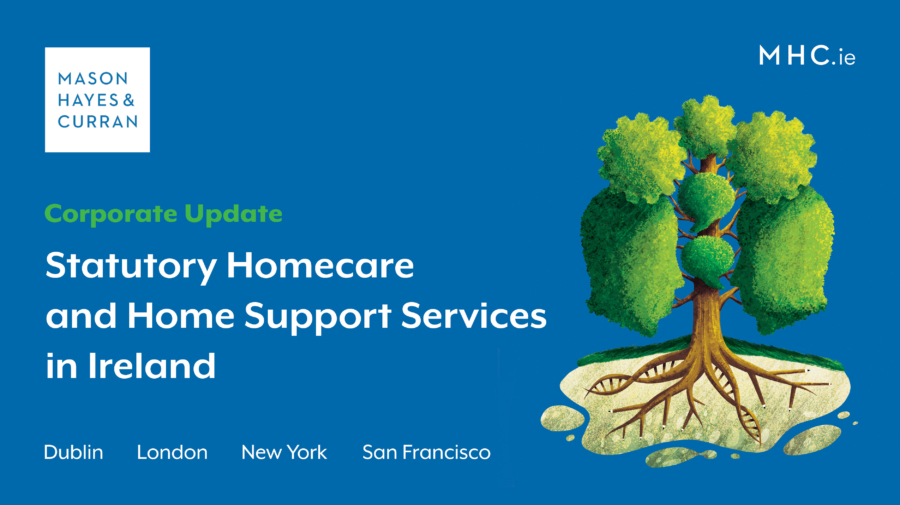
While there is no specific timeline on the establishment of a new statutory home support scheme at this time, it is understood that legislation for a new scheme is at an advanced stage. Our Corporate team reviews the timeline of progress made so far and outlines the anticipated further developments we expect to see before the end of this year.
Despite the commitment from Ireland’s Department of Health to develop a new statutory scheme for home support services, there is still no statutory entitlement to receive formal homecare or home support.
Current provision of home support services
The majority of homecare and home support services provided in Ireland are delivered on an informal basis by family, friends, and neighbours. Publicly funded home support services are provided directly by the state healthcare provider, the Health Service Executive (HSE). They are also provided by external or private providers commissioned by the HSE. While these services are free of charge, they are based on service users’ assessed care needs.
There is also no statutory regulation of private hospitals, homecare or home support services or other community-based social services in Ireland. The HSE acts as both provider and commissioner of these services, oversees and monitors the provision of services it provides or procures. However, there have been many calls for the introduction of a national statutory scheme which would regulate both the publicly and privately funded home care and home support sectors.
Progress timeline
Work across various areas has been ongoing within the Department to progress a new statutory scheme for some time. For example:
- In April 2021, the Government gave its approval to the Minister for Health to start drafting legislation to establish a licensing framework for providers who operate in the homecare sector. After targeted stakeholder consultation, it is understood that the development of regulations and standards is now at an advanced stage.
- In March 2022, a cross-departmental Strategic Workforce Advisory Group was established and charged with identifying strategic workforce challenges in publicly and privately provided front-line carer roles in home support and nursing homes and developing recommendations. This group examined issues such as recruitment, retention, training, career-development, pay and conditions and barriers to employment for front-line carers in these sectors.
- In May 2022, further to its evidence review on home support HIQA, the independent Health Information and Quality Authority, published its report. HIQA has also developed standards for home care and home support services.
- In June 2022, the Department launched a six-week public consultation on draft regulations and the analysis of the results by the IPH was published in January 2023.
- In October 2022, the Strategic Workforce Advisory Group published its report. The report contained 16 recommendations in the areas of recruitment, pay and conditions of employment, barriers to employment, training and professional development, sectoral reform, and monitoring and implementation. These recommendations are now being progressed through a dedicated implementation group. One of the recommendations has been implemented. In December 2022, the statutory instrument authorising the issuance of 1,000 employment permits for home care workers was signed and many organisations in the sector have availed of and utilised this process.
- The Department has also examined a range of funding options for the new home support scheme. In March 2023, a policy dialogue showcasing national and international research commissioned by the Department on future funding options for home support was held. A report entitled: “Improving Home Care Sustainability in Ireland” from the European Observatory on Health Systems was published. In addition, the Economic and Social Research Institute undertook a programme of work on behalf of the Department on the potential demand for, and cost of, home support which culminated in two reports. These can be viewed here and here.
- In June 2023, the first meeting of the implementation group took place and it is envisaged that the implementation group will meet quarterly and publish progress reports thereafter. It is understood that work is underway on all recommendations with others being progressed.
The Department has also been in regular consultation with HIQA, the HSE, legal counsel, and representative groups to help improve the regulations further. In addition, the HSE has been undertaking various recruitment processes to support the establishment of a National Home Support Office.
While there is no specific timeline for the establishment of a new statutory home support scheme at this time, it is understood that the legislation for the new statutory scheme is at an advanced stage and we expect to see further developments before the end of 2023.
Proposed statutory home support scheme
When introduced, the new law will require homecare and home support providers to hold a license from HIQA before they can operate. HIQA will monitor and manage compliance by public, private, and not-for-profit providers of homecare and home support services. People providing such services will be called “home-support workers”.
It is proposed that the regulations will apply to home-support workers providing personal care or practical assistance to people who are ill, frail, disabled or otherwise vulnerable living at home.
It is envisaged that certain services, however, will be exempt from the proposed regulations including:
- Support provided to minors
- Support provided in the context of personal relationships and where no money is exchanged, and
- Services provided exclusively by registered healthcare professionals such as nurses or physiotherapists
Also, a direct employment relationship between an individual home-support worker and a single servicer-user will also be exempt.
The regulations will set out the basic rules for how home-support providers should operate and cover four main areas. These areas are: service-delivery, staffing, corporate governance and corporate oversight. Some key features of the proposed regulations include:
- A system of licensing which will include minimum requirements to qualify for a license and also allow HIQA to impose licensing conditions. It will be an offence to operate without a license.
- The imposition of specific staffing requirements on service providers to include recruitment, employment terms, education, training and supervision.
- Requirements on service providers to have a clear written statement of purpose which is readily available to the public, and which should be reviewed annually. Any changes to the statement of purpose will be required to be approved by HIQA.
- Requirements to implement policies concerning topics such as safeguarding and protection, risk-management, infection prevention and medication management. These policies must be monitored, reviewed and updated, as may be necessary, as set out in the regulations.
- Requirements to put in place and explain to service-users any complaints procedures.
- Requirements to put in place written contracts to include minimum terms, including specific provisions on how the contracts can be terminated and notice requirements, with service-users. Providers are also required to draw up a personal support plan for service-users. This is required to be discussed and agreed with the service-user and reviewed as required.
- Specific requirements in relation to the management of records, financial procedures, monitoring quality of service and compliance with the regulations. In addition, there are specific reporting obligations including producing an annual report no later than March 1st each year.
Response to draft regulations
While the sector supports the introduction of the new law, some concerns have been raised including the following:
- Respondents were broadly supportive of formal education and training requirements. However, they expressed concern that these requirements could exacerbate existing recruitment issues by pushing some workers out of the sector or deter them from joining it.
- There were queries as to how the costs of education and training would be funded. In addition, they are concerned that the costs of complying with the regulations could be very high and lead to reduced service provision and smaller providers leaving the market.
- Some respondents said that compliance, in particular increased recordkeeping, would be very burdensome. They were concerned that this would detract from the time home support workers had for engagement with service users.
- There was a concern that the exclusion of direct employment relationships from regulation could prompt a move towards more provision of services by unregulated, self-employed workers employed directly by service users. This would create a two-tier system of regulated and unregulated home support.
- Over-regulation may lead to a one-size-fits-all standard of care when service users, workers, and providers require some flexibility.
Those working in the sector have also called for the inclusion of a rights-based approach or a specific human rights framework within the regulations. They have also highlighted the importance of the regulations in complying with, and making explicit reference to, the principles and legal obligations under the new Assisted Decision-Making (Capacity) legislation.
Conclusion
Homecare is an increasingly in-demand and vital service. By 2040, it is estimated that 23% of the population in Ireland will be aged over 65. With the projected increase in our ageing population, we need to prepare for the increasing demand for homecare and home support services in our communities.
Work across various areas has been ongoing within the Department to progress a new statutory scheme and it is understood that the development of regulations and standards is at an advanced stage.
If you are a homecare or home support service provider and have any questions or queries in relation to your business, please contact a member of our Healthcare or Corporate teams.
The content of this article is provided for information purposes only and does not constitute legal or other advice.
Share this:




